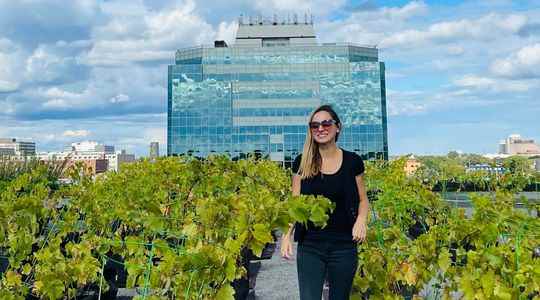It takes about half an hour by car to reach District Central from the center of Montreal. It is here, in the heart of the former Cité de la mode, that the Centrale agricole settled in 2019, between the Rockland Center and the Central Market. A unique place, dedicated to innovation, food production and processing. Founded by the Urban Agriculture Laboratory AU/Lab, this cooperative brings together around twenty companies and actors. Their common point? All aim to develop urban and virtuous solutions, based on the circular economy.
Among the project leaders, Véronique Lemieux is a key ambassador. With her trendy jacket and boots, the founder of Vignes en ville is not a reconvert of the fashion industry, but a winegrower. After a degree in international business, the sale of solar panels in China and the import-export of wine, she trained in permaculture at Oregon State University (United States), then, in Quebec, in viticulture in cold climates. Entrepreneur and scientist at heart, she breaks the codes of traditional agriculture. And it is in the middle of the brand new cellar, surrounded by barrels, that the young woman exposes her areas of development.
From a vine on the roof… to three research projects
If Vignes en ville was born from a research project on the behavior of this plant in an urban environment, ramifications have been added to it. To cultivate her vineyards on the roofs and soils of Montreal – six to date, including 200 plants planted in 2020 at the top of the Agricultural Center – Véronique Lemieux could not bring herself to use sand, environmental convictions oblige. She then tested a soil based on crushed glass from wine bottles, a source of waste in the Quebec city. This is his second research project. Success is on the way. “Two years after the first plantings, a significant quantity of grapes came out of these vines, and the quality was there”, she says.
Supported by the Société des alcools du Québec, the Palais des congrès de Montréal, the solidarity recycling collective Tricentris and the video game company Ubisoft, Véronique Lemieux continues her journey… until she ends up with another discovery: “The mycorrhiza degrades the glass, which returns to the natural state of sand,” she explains. The advantage: not only does the glass disappear, but it also releases silica and carbon, nutrients and minerals important for the growth of fruits and vegetables. The process would therefore enhance soil fertilization. This is the third research project: “We are collaborating with different universities and we have been chosen as one of the 1000 promising projects for humanity of the Solar Impulse Foundation”, she says with satisfaction.
Such a community initiative
Despite still low production, the entrepreneur vinifies her wine in the cellar created from scratch on one floor of the Agricultural Center, with the collaboration of Lieux commun, a start-up founded by four young urban winegrowers. It is not a question of selling bottles, but rather of experiences, with visits and tastings of its natural wines. Objective: to democratize urban agriculture and demonstrate the potential for duplication. In this idea, the young woman has also distributed 1000 vines to the inhabitants of the district of Little Italy. And plans to make a great vintage of it in 2024. If Véronique Lemieux is still part of the big AU/Lab family, Vignes en ville took off this year. Will his wines be like him, sparkling and elegant? It is still too early to tell, but his projects are certainly promising!
